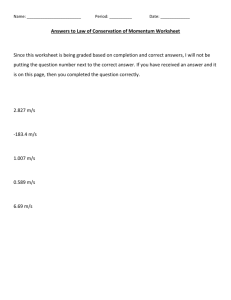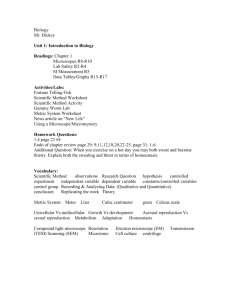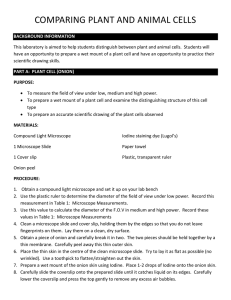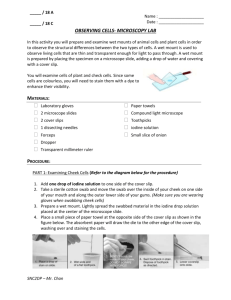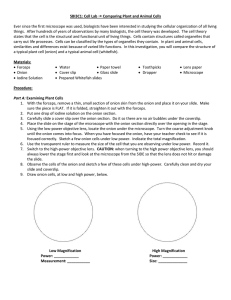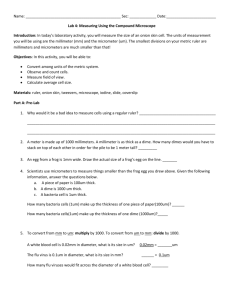Jumpstart
advertisement
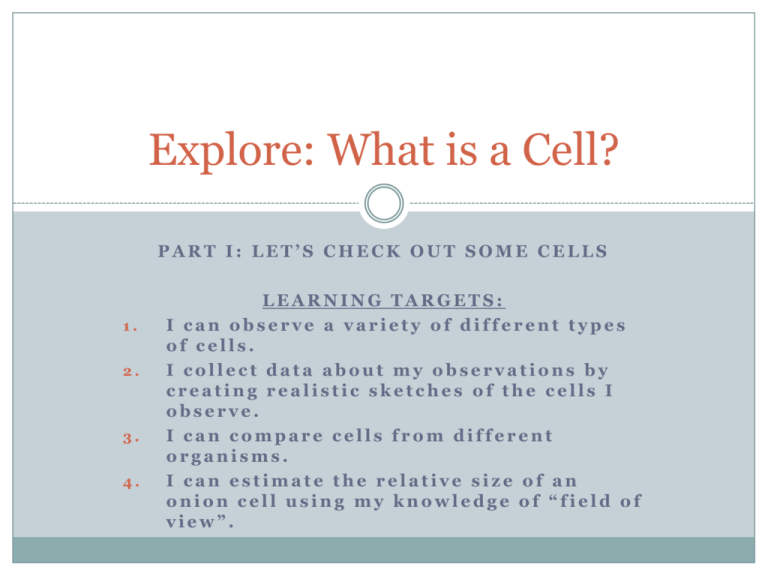
Explore: What is a Cell? PART I: LET’S CHECK OUT SOME CELLS 1. 2. 3. 4. LEARNING TARGETS: I can observe a variety of different types of cells. I collect data about my observations by creating realistic sketches of the cells I observe. I can compare cells from different organisms. I can estimate the relative size of an onion cell using my knowledge of “field of view”. Agenda 03-20-12 TO BEGIN: Copy learning targets onto a blank sheet of paper. Head the paper with your name. Process and Procedures 1-6 COLLECT MATERIALS: microscope, clear plastic ruler READ: “Field of View” Protocol LISTEN: For specific lab directions COMPLETE: lab, collect accurate data Stop and Think #1-3 (pg. 262) HOMEWORK: Reflect and Connect #3 (pg. 264) Process & Procedure #1 1. Complete the front side of the “Introduction to Microscopes” worksheet. Use pages 257 to 260 to find your definitions. Answer the review questions about the parts of the microscope. Process & Procedure #2 2. Collect the following materials for each PAIR of people: Microscope (leave the cord & cover at the back counter) “cell” ruler Process & Procedure #3 & 4 3. Read the “Field of View” Protocol beginning on page 257. Use what you read to fill in the table on the back of your “Introduction to Microscopes” worksheet. (#7) Complete #9 on the back of your worksheet. Can you correctly predict the size of these specimens? Listen carefully and take notes on the correct procedure for “wet mounting” a specimen. (#8) Entry Task Predict the length and width of the following cells: 40X magnification 100X magnification length = 0.9mm length = 0.4mm width = 0.45mm width = 0.26mm Process & Procedure #5 & 6 5. Create a table to collect data on the following slides: Onion skin Human cheek cells Human blood Plant leaf (lillium or syringa) Bacterium (various) Paramecium You will be wet mounting your own samples for the onion skin and the human cheek cells. CLEAN-UP Return prepared slides to the teacher. All OTHER cell samples can be thrown in the trash. Wash and wipe dry all coverslips and slides (BE CAREFUL!) and return to the front. Wipe down ALL other equipment and return to lab stations. Spray and wipe down group tables (and chairs if needed). Make sure EVERYTHING is in the same condition it was in when you first got it. All materials returned to same place All materials cleaned and in good repair Goggles in cabinet and Aprons hung by the door Stop & Think Read and answer questions 1-3 on page 262. Use IQIA and make sure that you are supporting your ideas with EVIDENCE. HOMEWORK TURN IN TODAY: 1. Classwork Paper 2. Learning Targets Cell Data Table S&T #1-3 “Introduction to Microscopes” Worksheet Homework: Reflect and Connect #3 (pg. 264)


